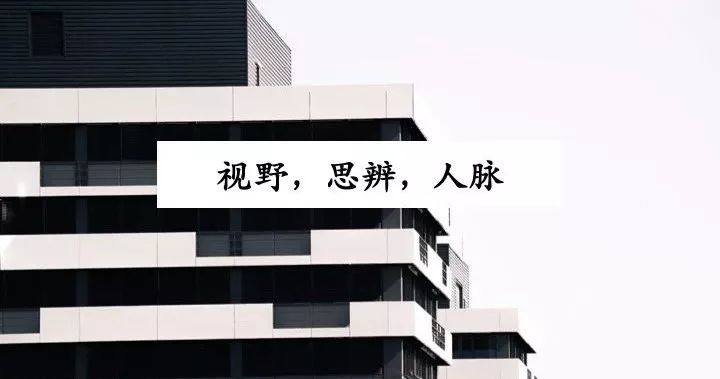In addition to job-hopping, there are other unexpected effects of interviews.
Editor’s note: This article is from WeChat public account “ 张良 计 ” (ID: zhang_liangj), author Zhang Liangji.

0 1. Interviews are a great opportunity to broaden your horizons
I always encourage you, whether you want to change jobs or not, you can go to some interviews if you have the opportunity. Especially for some mid-to-high level jobs, interviews are an excellent information channel to help you understand the status of the industry.
Because of this level, your vision is no longer limited to the work of “screws” on your hands.
For example.
Many people working on products and projects in Internet companies will gradually transition from “technology” to “management” when they are managers and directors. The concern is not only how to develop a page and design an icon , Or tease out a user experience process.
Their focus will gradually shift from their own department work to external markets, partners, and competitors.
For example, how to tap market demand, how to differentiate from competitors’ products, and how to mobilize the resources of the company group and external suppliers for promotion.
These matters involve a wider scope, a higher degree of difficulty, and greater value.
At this time, the interview can help you open up these horizons.
When you interview for a higher level job, the interviewer’s question will be “escalated” accordingly. They will introduce to you the current status of the company, the layout of the product business, the current problems encountered, and the expectations for your position.
Together with this information and your calm analysis, you can roughly describe the strength and position of this company in the industry.
You need to know that in some industry news or public relations drafts, you can’t see how a company really is. Because it’s all “moderately beautified” text. Only when you go to the field to investigate, inquire, inquire, and grasp first-hand information is the most reliable.
Interviewing is how you can explore the strength of the company.
Take me as an example. I do advertising marketing. At 15-16 yearsWhen I was at home, I tried almost all the advertising companies in Shanghai that were famous.
In the countless interviews, I have focused on 4 pieces of information:
1. The company’s staff size and team structure;
2. Customer types and customer lists served;
3. Project cases that have been done before;
4. Collaboration resources inside and outside the company;
Behind these four questions, each has its own meaning.
The first company’s staff size and team structure examined the current status of operations behind the company.
In general, a company with a small number of people has a high operating risk, and a company with a large number of people is relatively safer. The team structure represents the company’s business focus and positioning of employees.
For example, some advertising companies are famous for creativity, so the number of creative teams will be larger, and some companies are technically well-known, so the technical team is more adequately equipped.
From this information, we can see the operating style of a company.
The second type of customer service and customer list examines the richness of the company’s business lines.
For example, some companies try their best to serve only 1-2 large customers, which is actually problematic.
This is equivalent to what the investment field says, putting all your eggs in one basket. The simplification of business lines is an industry where creativity is at its core, and it is very easy to restrain new ideas and inspirations. Conversely, if a company serves a more diverse range of customers, it is unlikely that cash flow problems will occur immediately due to the loss of one or two customers, so the ability to resist risks will be relatively strong.
The third project case I have done is to examine the company’s ability level.
If a company does n’t have a case, or if you do, but you do n’t think it is such a case, then this company is really not worth your time.
Conversely, if it is a company that has done well-known cases frequently, you can continue to inquire about their operating experience to see if it is worthy of the name. Finally, judge whether joining them can help your career development.
The fourth internal and external collaborative resources of the company examines the company’s industrial chain advantages.
I have mentioned that any mature industry is the precise division of labor and cooperation between upstream and downstream. In addition to its own level, how does a company’s relationship with other partners in the industry be able to obtain superior resources and jointly make influential things? This is the last information to focus on.
For example, I once interviewed an advertising company. In addition to their good creative abilities, they also have inextricable links with the film and television entertainment industry, so they can get the first-hand resources of many stars at relatively low prices. This is a huge advantage.
The above 4 questions can be solvedI heard from headhunters or heads of business units, and even during interviews with general managers.
The information gathered, like a puzzle, accumulates, and finally constitutes a new understanding of the industry.

02. Interviews are an excellent stage to exercise your abilities of thinking
A benign interview is by no means a mechanical one, you ask me to answer, but a master who comes and goes.
Superb interviewers will test your way of thinking, analyzing and solving problems, and on-the-spot response through various unexpected questions.
I have had several unforgettable interview experiences. Although I didn’t get it, I learned a lot from this process.
I remember once when I was interviewing for a marketing planning position with a well-known short video company. The interviewer hurriedly glanced at my resume, briefly asked about past project experiences, and suddenly asked me:
“Where do you think our company’s products are not doing well enough?”
I never expected this question.
Although I used to conduct interviews with interview companies in advance in the past, most of them knew the company’s background, advantages, and industry status.
This is the first time I have asked the interviewer to challenge my company.
Fortunately, I often use their apps, so from the perspective of user experience, I have mentioned a few shortcomings. For example, the user page design is not reasonable, the content recommendation is not intelligent enough, the commercial advertisement is too abrupt and so on.
After listening to the interviewer, I asked the second question:
“If you have the power to change our company’s product settings, how would you optimize it?”
To be frank, this issue has exceeded the responsibilities of the “Marketing Planning” position, but it has caused my interest. Because this is an open question, and there is no fixed standard answer, I can open my mind and come up with my own ideas.
Finally, the interviewer asked a third question:
“Why are you doing this?”
This question suddenly brought me back to reality. I just said so many reliable and unreliable suggestions. Now I need to find reasonable reasons to support my point. So I stepped back and rethought again, and picked out reasonable suggestions, discarding those who just patted my head.
The whole process is less than 10 minutes, but in the interaction with the interviewer, I graduallyDiscovered his vision limitations.
Especially as a marketing planner, the lack of knowledge in the field of product design makes me often inadequate and comprehensive when considering issues.
For example, when I feel that the user experience is not good, I will take it for granted that changing an icon setting, or simplifying a few steps is OK.
But doing so may make other users feel inconvenient to use, and even move the entire product’s architecture, which in turn will cause greater costs and lose more than gain.
On the surface, this is just a simple question and answer during an interview. In fact, the interviewer examines my understanding of the product and my thinking habits when analyzing the problem. Does it focus on what the eyes can see and ignore the things that are invisible behind the eyes.
This interview gave me an unforgettable lesson.
Since then, I have been actively responding to various interview opportunities. Regardless of the end result, this process has taught me a lot.
Especially if you are lucky enough to interview some very powerful companies, when facing a very powerful interviewer, this opportunity for interactive communication is a review of your self-discipline ability.
This is enough whether the last job change was successful or not.

03. Interviews are a great bridge to build industry connections
The last benefit is my accidental discovery.
When you attend enough interviews, you will find people you know in many companies. They will open up unexpected new opportunities for your future career.
The premise of all this is that you need to use to conquer them.
We all know that Cao Cao and Liu Bei are deadly opponents, but Cao Cao prefers Liu Bei’s Guan Yu and racks his brains to save him.
This is because Guan Yu already has a good reputation, and he has made outstanding achievements many times, even his opponents in the house can’t help coming to dig the wall.
The same principle applies in the business world.
When you have reached a certain level of knowledge and professional skills in an industry and have done some successful project cases, then your reputation cannot be hidden.
Today’s Internet is so developed that it should not be too easy to investigate a person. Headhunters in those industries, HR of major companies, as long as you send a WeChat to each other, or make a phone call to inquire, your background information will be written on paper.
Don’t think these huntersThe head and the HR are just a simple competitive relationship. In order to compete for a talent, they secretly compete and will not share information.
This is just a superficial phenomenon. In fact, they are competing and cooperating, both competing and cooperating.
They will not only share talent information, but also industry information, the operating status of various companies, gossip about management changes, and so on.
The HR of the rival companies in the two industries are good friends in real life. This magical and exciting thing is a reasonable result of the principle of maximizing benefits.
The principle of dying in isolation and living in groups is common in any industry.
Knowing this, and deducing to each of us in turn, you will know that as long as one door is successfully opened, many doors will be opened for you later.
So don’t take the results of an interview too seriously, but use your talents as much as possible to make a good impression on the other party.
The factors that determine the success of a job change are much simpler than an interview. It also involves the company’s business development status, personnel structure adjustments, management changes, and even many strange reasons you would never expect.
The company opens a recruitment position, and it is common for the interview process to go to the middle and suddenly close the position. The business world is changing, and no one can predict what it will look like tomorrow.
You can’t decide the outcome, but you can grasp the process. The significance of the process is sowing, not harvesting.
The interview is not for the last position, but whether you can meet the person opposite.
The interviewer’s experience and qualifications are deeper than you. If you can leave him an excellent and deep impression, he will be promoted in the future, or he will move to another company and want to recruit again. Will I leave a door for you?
If you are excellent enough to excel, even if he finds that you are not suitable for this position in the end, he will recommend you to colleagues in other companies. Does this open more doors for you?
Perhaps you would say, is the interviewer so stupid, letting people meet?
People with a narrow-minded mind won’t do this. People with long-term vision will definitely do so. Because if he does this, then when he asks for others, he will leave a human relationship.
Helping others is helping others. The green mountains are always there, and the reason for the long flow of green people knows that you don’t need to worry about it.
This is today’s article. Finally, to briefly summarize, in addition to changing jobs, interviews also have three important functions:
1. Interviews are an excellent opportunity to broaden your horizons;
2. Interviews are an excellent stage to train your ability to think;
3. Interviews are an excellent bridge for building industry contacts;
I hope for your inspiration and help. Thanks everyone for your time =)

